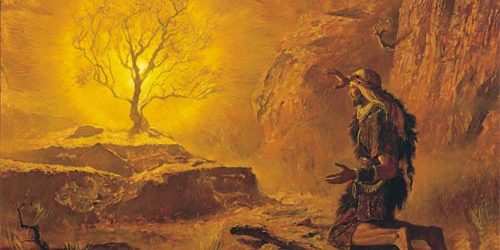
The Bible is a Story About God
By Steve Weaver
Parents know that children who are raised in church give the same answer when asked virtually any question about the Bible: God. Although this predictable answer is sometimes humorous, the answer is given for good reason. Children learn early on that God is the right answer to so many questions. Who made the world? God. Who made the trees? God. Who made the sun? God. Who made the stars? God. Who made you? God!
Somehow as we grow older we forget this simple answer and begin to substitute more complicated answers for everything. The purpose of this second article is that children and adults alike would answer the question: “What is the Bible about?” with the simple answer: “God!”
This post is the second in a series of six (read part 1) that seeks to develop the following summarizing sentence about the Bible: “The Bible is the story of a God who makes a spectacular promise about a supernatural person who creates a special people to live in a supernal place with Him forever.”
As early as the first four words of the Bible, “In the beginning God,” we can tell that the main subject of the Bible is God Himself. God is both the author of Scripture and its subject. From Genesis to Revelation the Bible is God’s revelation of Himself to mankind. While God’s power and glory are evident in the created order, the fullest revelation of the character of God is found in Scripture. It is in the pages of sacred Scripture alone that the nature of God are both cogently described and clearly displayed.
Without Scripture we could not know God. God is infinite (unlimited), we are finite (limited). Therefore, if human beings were ever to know anything about God, God had to reveal Himself. Thankfully, this is exactly what He has done. As Hebrews 1:1-2 states,
Long ago, at many times and in many ways, God spoke to our fathers by the prophets, but in these last days he has spoken to us by his Son, whom he appointed the heir of all things, through whom also he created the world. (ESV)
These verses show us that God has revealed Himself in the pages of the Old Testament through the prophets and in the pages of the New Testament most fully in the person of Christ. God has revealed Himself in Scripture by both definition and demonstration. First, the attributes of God are defined. God is said to be holy (Isaiah 6:3), righteous (Romans 3:25-26), light (1 John 1:5), love (1 John 4:8), merciful (Exodus 33:19), and a spirit (John 4:24).
The attributes of God are also displayed for us in the various stories of Scripture (the subplots that support that major plot). For example, the story of creation shows God’s power, glory and intelligence. The story of the flood shows God’s judgment while at the same time highlighting His mercy. The story of Abraham shows God’s grace in choosing a people for Himself. The story of Joseph shows God’s faithfulness to His people. The story of Moses shows that God is faithful to His Word. The life of Jesus shows the glory of God on display for 30 plus years. The death of Jesus shows at once the wisdom, justice, holiness, wrath, righteousness, love, mercy, and grace of God. As John Piper has so eloquently stated about the cross, “The wisdom of God has ordained a way for the love of God to deliver us from the wrath of God without compromising the righteousness of God.”
In short, the Bible is a story about God!!!
Steve Weaver is the pastor of Farmdale Baptist Church in Frankfort, KY. He is married to Gretta and they have been blessed by God with six children (Haddon, 12; Hannah, 10; Isaac, 7; Jonathan, 5; Lydia, 4; and Katherine, 0). Steve holds an M.Div. from The Southern Baptist Theological Seminary, and is currently pursuing a Ph.D. in Church History at The Southern Seminary. His area of research is 17th century British Particular Baptist pastor, Hercules Collins. He also is a Research and Administrative Assistant to the Director of The Andrew Fuller Center for Baptist Studies, Michael A.G. Haykin.

